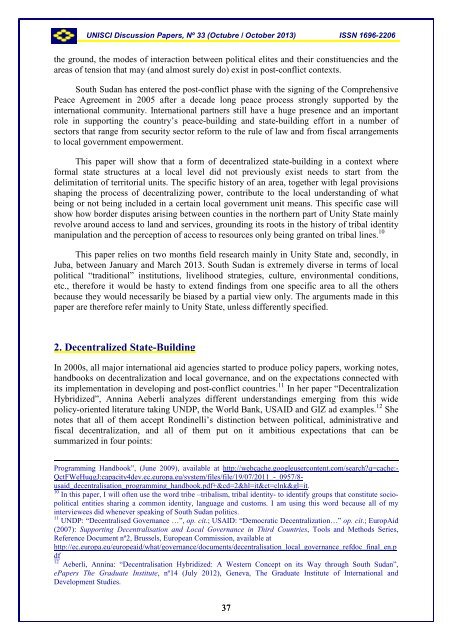UNISCI - Universidad Complutense de Madrid
UNISCI - Universidad Complutense de Madrid
UNISCI - Universidad Complutense de Madrid
Create successful ePaper yourself
Turn your PDF publications into a flip-book with our unique Google optimized e-Paper software.
<strong>UNISCI</strong> Discussion Papers, Nº 33 (Octubre / October 2013) ISSN 1696-2206the ground, the mo<strong>de</strong>s of interaction between political elites and their constituencies and theareas of tension that may (and almost surely do) exist in post-conflict contexts.South Sudan has entered the post-conflict phase with the signing of the ComprehensivePeace Agreement in 2005 after a <strong>de</strong>ca<strong>de</strong> long peace process strongly supported by theinternational community. International partners still have a huge presence and an importantrole in supporting the country’s peace-building and state-building effort in a number ofsectors that range from security sector reform to the rule of law and from fiscal arrangementsto local government empowerment.This paper will show that a form of <strong>de</strong>centralized state-building in a context whereformal state structures at a local level did not previously exist needs to start from the<strong>de</strong>limitation of territorial units. The specific history of an area, together with legal provisionsshaping the process of <strong>de</strong>centralizing power, contribute to the local un<strong>de</strong>rstanding of whatbeing or not being inclu<strong>de</strong>d in a certain local government unit means. This specific case willshow how bor<strong>de</strong>r disputes arising between counties in the northern part of Unity State mainlyrevolve around access to land and services, grounding its roots in the history of tribal i<strong>de</strong>ntitymanipulation and the perception of access to resources only being granted on tribal lines. 10This paper relies on two months field research mainly in Unity State and, secondly, inJuba, between January and March 2013. South Sudan is extremely diverse in terms of localpolitical “traditional” institutions, livelihood strategies, culture, environmental conditions,etc., therefore it would be hasty to extend findings from one specific area to all the othersbecause they would necessarily be biased by a partial view only. The arguments ma<strong>de</strong> in thispaper are therefore refer mainly to Unity State, unless differently specified.2. Decentralized State-BuildingIn 2000s, all major international aid agencies started to produce policy papers, working notes,handbooks on <strong>de</strong>centralization and local governance, and on the expectations connected withits implementation in <strong>de</strong>veloping and post-conflict countries. 11 In her paper “DecentralizationHybridized”, Annina Aeberli analyzes different un<strong>de</strong>rstandings emerging from this wi<strong>de</strong>policy-oriented literature taking UNDP, the World Bank, USAID and GIZ ad examples. 12 Shenotes that all of them accept Rondinelli’s distinction between political, administrative andfiscal <strong>de</strong>centralization, and all of them put on it ambitious expectations that can besummarized in four points:Programming Handbook”, (June 2009), available at http://webcache.googleusercontent.com/search?q=cache:-QctFWeHuqgJ:capacity4<strong>de</strong>v.ec.europa.eu/system/files/file/19/07/2011_-_0957/8-usaid_<strong>de</strong>centralisation_programming_handbook.pdf+&cd=2&hl=it&ct=clnk&gl=it.10 In this paper, I will often use the word tribe –tribalism, tribal i<strong>de</strong>ntity- to i<strong>de</strong>ntify groups that constitute sociopoliticalentities sharing a common i<strong>de</strong>ntity, language and customs. I am using this word because all of myinterviewees did whenever speaking of South Sudan politics.11 UNDP: “Decentralised Governance …”, op. cit.; USAID: “Democratic Decentralization…” op. cit.; EuropAid(2007): Supporting Decentralisation and Local Governance in Third Countries, Tools and Methods Series,Reference Document nº2, Brussels, European Commission, available athttp://ec.europa.eu/europeaid/what/governance/documents/<strong>de</strong>centralisation_local_governance_refdoc_final_en.pdf12 Aeberli, Annina: “Decentralisation Hybridized: A Western Concept on its Way through South Sudan”,ePapers The Graduate Institute, nº14 (July 2012), Geneva, The Graduate Institute of International andDevelopment Studies.37
















